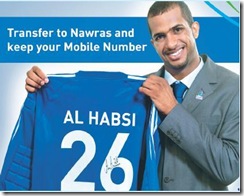A regulatory framework is under construction for mobile and fixed-line number portability to be introduced in Bahrain by the end of the first quarter next year. Michelle Mills considers the point of implementing the regime in a country with a population of less than 750,000

It is surprising that consultant John Horrocks is advising Bahrain’s regulator on how best to establish number portability (NP) in the kingdom, considering he has been outspoken in his view that NP is not feasible in smaller countries with populations of less than 10 million people. He believes that under such circumstances, the costs significantly outweigh the benefits.
Horrocks heads his own consultancy and is considered to be an international expert in the field of number portability, drawing on 16 years experience in advising regulators and operators on the subject across Europe, Malaysia, Saudi Arabia and South Africa.
He suggests that because mobile number portability is relatively expensive to implement, “there is certainly a critical size below which MNP is not cost-effective. This size depends on the market conditions, but is in the range of one million to 20 million subscribers”.
According to Horrocks, the main prerequisites that a country should have in order to contemplate the introductions of MNP are, “competing operators and a sufficient size of the subscriber base”.
So the Bahrain Telecommunications Regulatory Authority (TRA) has decided to go full steam ahead with its NP project despite some opinions that suggest the development could in fact have a negative financial impact on operators.
For its part, the TRA is not pursuing further industry discussions on the matter. It appointed consultants Horrocks Technology and Mott McDonald to draft legislation and determine what the most cost-effective solution is for the introduction of NP.
With these recommendations due to be completed in late August, operators will be left with approximately seven months to conform to the TRA’s requirements should the deadline for the implementation of NP be met in March 2009.

Batelco’s Imme Bodammer says her company’s cost-benefit analysis shows number portability would bring negative net benefits to Bahrain
Incumbent operator Batelco has undertaken cost-benefit analysis of NP, which the telco claims suggests the regime should not be implemented at all in the island nation. While such opposition is a predictable reaction from an incumbent with a larger market share, the results from its analysis, through a study commissioned by Hibbard Consulting, concluded that whether using an All Calls Query (ACQ) or an Onward Routing (OR) solution, the net result of NP implementation in Bahrain would be a negative one.
“The NP debate is mainly focused on the ‘how’ to implement NP – but what is the economic basis for NP implementation?” questioned Imme Bodammer, Batelco’s principal economics advisor. “In Bahrain, NP is not economically justified, it is not a viable business case.”
Quoting an Ovum study on the effect of number portability on microstates (sovereign states with an area less than 1,000 kilometre² and with fewer than one million inhabitants) Bodammer stated that small economies bear an over-proportionate cost burden relative to the benefits arising from regulations.
According to the Hibbard Consulting study, it has been estimated that Bahrain’s operators − Batelco, Zain, the forthcoming new entrant and possibly smaller wholesale operators such as 2Connect and Mena Telecom − would potentially need to outlay up to US$10 million each in adjusting their internal processes and technologies.
“The costs of regulation vary little with the size of the population. For example, the costs are the same in the UK in relative terms as the costs that would arise were NP to be implemented in Bahrain,” asserted Bodammer. “With a small population, it is a question of productive efficiency versus competition, and this is applicable to all regulatory measures,” she added.
Other findings from Hibbard Consulting’s study show Bahrain’s consumer market does not need number portability as an incentive to switch providers and take advantage of competitive offers. No SIM locking or long-term contracts currently exist in Bahrain, a significant segment of mobile users call internationally using discounted calling cards, 17 per cent of mobile users have more than one SIM card, and even handsets are available that carry two SIM cards.
Bodammer also argues that the benefits of the introduction of NP are vague and the effects cannot be measured accurately, because number portability is almost always introduced in conjunction with the entrant of another operator. A case in point, the winner of Bahrain’s third mobile licence is due to be announced on December 4 with operations expected to start some months later.
Bodammer says that the TRA has not had enough consultation with the industry on the matter and that it has effectively forced the decision upon the operators.
“In Jordan there was three years of debate between the regulator and operators. Eventually the regulator withdrew the proposal (for the introduction of NP). What the TRA in Bahrain is trying to do is very ambitious and in my opinion, unrealistic given the timeframe,” Bodammer said. “There should be more careful consideration.”
According to the Bahrain TRA’s technical advisor and number portability project manager, Ahmed Aldoseri, in order to build on an open model of collaboration with the industry and key stakeholders, the regulator established an industry working group to jointly develop an implementation of number portability, and held the first session of the working group on May 26.
“With the complex nature of transferring numbers between local operators, it is vital that all operators effectively participate in the drafting exercise of all number portability processes to ensure a successful implementation,” Aldoseri stated.
The TRA’s Rob Middlehurst, director of market and competition, says that while the introduction of NP is still on course, the regulator is taking Batelco’s cost-benefit analysis into consideration.
“There are some useful things in there,” Middlehurst concedes. “But taking it a stage further and saying ‘is it going to change our view of whether number portability is going to happen or not?’…the answer is no. But, it may change our view on the most appropriate form of number portability,” he adds.
As part of a review of retail markets in 2007, a survey was undertaken by AC Nielsen on behalf of the TRA, interviewing 1,052 residential and 159 business consumers. Middlehurst says questions were asked with respect to whether consumers would change operator if they could keep their number, and whether phone numbers were important to them.

From left to right: Ahmed Aldoseri of TRA, John Horrocks of Horrocks Technology, Chris Pollard of Mott McDonald and Alan Horne, general director of TRA, at the beginning of the consultancy project
“Their answers were positive, there were more respondents saying yes than no. So that basically gave us some legitimacy to say there is sufficient demand there,” Middlehurst explains. “Our strategic review said we should remove any barriers of entry, and number portability allows people to switch operators and may stimulate further competition, so we are implementing it.”
The regulator recognises there are significant costs for operators to pay in deploying NP, and has publicly stated that it may contribute to that cost by covering the US$2 million cost of a central database solution. Some may suggest the TRA’s ‘generosity’ could in fact be an admission that the TRA acknowledges that the implementation expenses of NP could negatively and unnecessarily affect operators’ financial positions.
“If we decide we want the centralised database approach, then operators will have to implement their own solutions in-house including updating their billing systems,” Middlehurst commented to Comm. earlier.
“At this stage we haven’t made the firm decision to say we will fund the central database, we’re saying we are considering it. The reality of it is that we probably will fund it, but it depends what the solution looks like and what funding it means. But the operators would still have to fund their own back office costs.”
In Europe, costs to port a number range between €8 to 10 (US$12 to US$16), an amount Middlehurst says many operators bear as a cost of sales.
While the TRA is adamant that number portability will be implemented, it is interesting to consider what the alternatives could have been. At a workshop in Islamabad, Pakistan, held in August 2007, consultant Horrocks suggested to an audience comprising participants from Asia-Pacific, Middle East and Africa, possible alternatives for smaller economies.
In order to make number changes easier for subscribers without porting the numbers, operators could send a free SMS to all contacts on a subscriber’s SIM informing them of the number change, or there could be a low cost for maintaining an old number in parallel.
When it comes to implementing a technology solution to make NP possible, Horrocks says that while much attention is focussed on the central database, it is not essential, even for All Calls Query (ACQ) routing.
“Australia, Malta and Hong Kong have all achieved good porting levels and have ACQ routing, without having a central database. The database issue is widely misunderstood, even by regulators,” Horrocks commented previously.
“For example, the Channel Islands [a small group of islands in the English Channel] with a total population of 150,000, has three operators that are being forced by the local regulators to buy a central database and this is a pure waste of money, in my opinion.”
Nawras scores goals with MNP ambassador

When mobile number portability (MNP) was introduced in Oman in August 2006, Nawras, the second mobile operator, launched a public awareness campaign using international goalkeeper Ali Al Habsi. Al Habsi wears the number 26 and became the operator’s ‘MNP ambassador’, bringing his profile and popularity to community events.
Nawras’ product manager for business solutions and MNP, Shadli Al Abdulsalam, claimed the campaign was a success with 90 per cent of customers who used MNP switching to Nawras from Oman Mobile.
“Having Ali Al Habsi represent Nawras as our MNP ambassador, greatly benefited our efforts in publicising the service and educating the market on MNP, as well as helping to convert customers to our network,” Al Abdulsalam said.
By the end of 2007, Oman’s TRA reported that 24,000 customers had opted to use number portability, representing 0.96 per cent of mobile subscribers. While the porting rates are low compared to international benchmarks (international average is about 5.9 per cent), Al Abdulsalam says it added to Nawras’ customer base, despite the high costs involved.
“It has definitely been worth the investment. Business customers are often very interested in maintaining their mobile number and with MNP we have been able to attract a lot of business customers to Nawras,” he commented.
“Besides the direct impact from customers who ported to Nawras, we have also seen a big indirect impact as ported-in customers have recommended Nawras to their friends, business colleagues and family.
Al Abdulsalam provides the following list of factors that operators should consider when preparing for number portability implementation:
Business process
Most important for customers will be simplicity (one-stop shopping), reliability, short duration and the ease of prepaid porting The possibility to port number blocks is critical for corporate customers
Porting fees
Ideally, there should be no porting fees for customers If porting fees are used, they should be low, cost-oriented inter-operator fees
Marketing
Market education proves to be important for MNP success
Technical solution
Details of the technical solution are unimportant for the customer as long as they don’t impact the reliability of the process or the quality of services after porting National testing is important to ensure sufficient qualitya is maintained.
Number portability matrix
| Country | Operators | Penetration % | Competition | Awareness | Porting Time (days) | % Porting |
| Hong Kong | 5 | 125 | Very High | High | 1.5 | 14.6 |
| Finland | 3 | 105 | High | High | 5.0 | 10.6 |
| Spain | 3 | 105 | High | High | 6.0 | 7.8 |
| Australia | 4 | 80 | High | High | 0.3 | 7.5 |
| Ireland | 3 | 102 | High | High | 0.2 | 6.5 |
| Sweden | 4 | 113 | High | High | 5.0 | 6.1 |
| Belgium | 3 | 86 | Medium | High | 2.0 | 4.6 |
| Malta | 2 | 80 | Low | Medium | 0.5 | 3.6 |
| UK | 5+ | 111 | High | Low | 7.0 | 2.5 |
| France | 3 | 78 | Low | Low | 30.0 | 0.6 |
| Germany | 4 | 91 | Medium | Low | 6.0 | 0.4 |
Source: Mott McDonald





1 comment so far ↓
Interesting article. Shame I just read it today.
We’ve heard Batelco’s argument a dozen times at least, and quite honestly, their cost benefit analysis was a waste of time and money. And I will explain why.
TRA has no choice but to implement number portability as the Telecommunications Law in Bahrain specifically states that (paraphrased) number portability shall be implemented when sufficient demand exists. Don’t believe me? Go read it online for yourself on TRA’s website.
A survey of the Bahraini market demonstrated that demand does exist, and TRA therefore has no choice but to follow through with implementation. If Batelco really doesn’t want number portability in Bahrain, they would probably see better results by approaching the legislative body (parliament) and asking them to change the Law. TRA doesn’t make or change the law – it abides by it. NOT implementing number portability when sufficient demand exists directly contravenes the Law. That’s something Batelco won’t tell you, is it? I think Imme Bodammer should try reading the Telecoms Law before demanding explanations of economic feasibility, wouldn’t you agree?
Besides Batelco (being the incumbent operator), any other operator in Bahrain worth their weight in salt would’ve read the Law before applying for their license(s) to determine current, and future, requirements that may spell out investments. It’s not like number portability wasn’t mentioned in the Law!
Some quick facts that were *mis-stated in the article (plus some additional comments):
1. The population of Bahrain is over 1 million at the time of writing this article – this invalidates the applicability of the study conducted by Ovum which would apply to microstates with less than 1,000 KM2 AND less than 1 million population
2. The number of mobile subscribers is easily over a million (especially with some people carrying more than 1 mobile phone)
3. There are other elements that support the case for a central database, such as poor inter-operator relations that prolong, or even prohibit, drafting effective and fair porting and billing processes, and further to ensure a single technical standard for compliance by all operators
4. TRA is (emphasis on “is”) pursuing further discussions with the industry. They already published a draft regulation for public consultation along with a lengthy explanatory document
5. How in the world is TRA going to implement number portability anyway without further discussions with the industry? What the hell do they know about each operator’s OSS and BSS platforms?! Some common sense please?
6. Long term contracts do exist in Bahrain, and both current mobile operators can confirm that (phone subsidies anyone?)
7. I don’t know how it would cost small(er) operators about $10 million to implement number portability. Pickup the phone and call Microsoft, Porthus, IBM or any other company that provides number portability solutions and you’d probably get a quote that is around 10-20% of that (if even). But then again, this study was commissioned by the incumbent and done by a private consulting firm. So, no further comments there.
8. Even if the ballpark figure for implementing portability was around even $20 million, it’s the operators’ fault for not incorporating that into their business/feasibility plans before even starting up operations.
9. Operators would have 9-10 months – not 7 months – for implementation (consult the draft regulation for accurate information)
All-in-all, number portability, in my opinion, should be a user right. Batelco, in all its might, should stop crying like a baby while blaming TRA and should get its facts straight.
If the Law says “thou shall have number portability”, then it shall happen. Got a problem with that, take it to the law maker.
Oh, and please get an unbiased study to support your case, will ya, Batelco? When the study swears there are no long term contracts in Bahrain (or lock-ins), and that the cost to small companies with no fixed lines or mobile customers would be around $10 million, one would start to wonder…
Leave a Comment